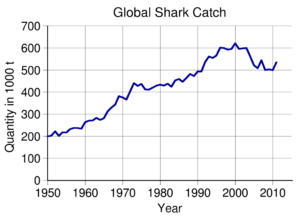With the current political tensions, the quarantine anxiety, and the stress of being a graduate student, I tried my best to keep my annual tradition of binge watching shark week. I’m no stranger to the biology of these sea dogs; the classic enhanced sense of smell strong enough to detect 1 ppm of blood in seawater, the trenchant vision to see in dark and low visibility oceans, the electroreception to detect electromagnetic fields produced by all living things. However, I believe not enough attention is brought to the eradication of the sharks.

Overfishing is a major problem worldwide. According to the United Nations a third of the world’s fish stocks are overfished, which means that species of fish are being removed faster than they can be replenished. It’s even worse for sharks where 100 million sharks are caught and killed every year, causing dozens of shark species to be considered critically endangered.

Modern sharks first appeared 100 million years ago in the Early Cretaceous period. In the time afterwards, they cemented their evolutionary niche as apex predators. With over 470 species of sharks, they are found in essentially every marine ecosystem. Thus, removing such a ubiquitous species will have negative implications.
Their notorious reputation as apex predators is double-edged. Shark fins are viewed as a status symbol in Asian countries and are considered essential in many folk medicines. Thus, begins humanity’s marine desiccation. In the early 2000s about 26-73 million sharks were caught and traded annually, whether that be the Greenland shark for fermented Icelandic hakarl or for shark fin soup for Parkinson’s in Hong Kong. Over the last 60 years, that number steadily increased and is now unsustainable.

The majority of shark fisheries have little oversight. Thus the rising demand of shark flesh causes an increased economic incentive to overfish. This leads to the catching of immature sharks, which reduces the species’ ability to repopulate. This cycle of overfishing leads to a waning population that cannot recover, with the only avenue of hope being reducing demand.

All hope is not lost though. Many governments have moved to a conservationist stance. The US in particular passed the Shark Finning Prohibition Act in 2000 and further cemented the law when it was challenged in 2008 in United States v. Approximately 64,695 Pounds of Shark Fins. Many countries have followed suit, but commercial fishing of sharks remains high. The world is currently facing many unprecedented issues. Shark fishing may not be the most pressing at the moment, but it would be a tragedy for the world to lose these living fossils.
Peer edited by Breanna Turman
An impressive and well researched blog.